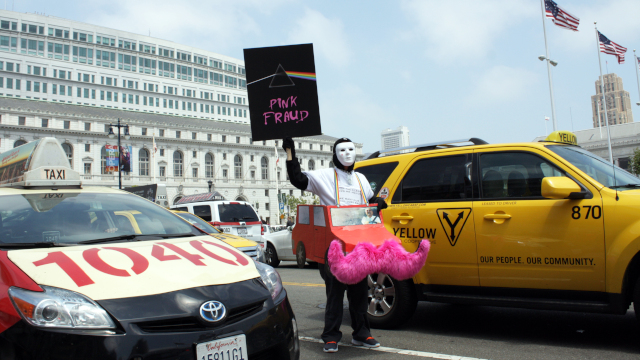Both sides in this conflict have their talking points. In San Francisco, where taxi service has been notoriously spotty, the TNCs, their fans and even some cab-industry folks say the taxi business has no one but itself to blame for the considerable loss of customers. Meanwhile, taxi interests contend the TNCs continue to enjoy a huge competitive advantage because of the relatively loose CPUC regulations they operate under, as opposed to the strict municipal rules with which taxis must contend.
This could change. On March 6, the San Francisco Chronicle reported, the CPUC warned Lyft, UberX (Uber's TNC service), Sidecar and Wingz, two other ride-service companies, that they had 60 days to "complete deficiencies" in their applications to become officially certified. (They currently operate under a temporary order.) According to the Chron:
The most serious omission was information about how they inspect drivers’ vehicles. … The letter asked them to clarify:
-
Who is conducting the vehicle inspection?
-
What qualifications do they possess to conduct the inspection?
-
Any copies of contracts with outside vendors that may provide these services.
(You can read our own investigation here into safety and inspection issues at UberX.)
The CPUC has also said it will take stock of how well its TNC regulations are working in the fall.
Here's a rundown of developments in different cities where regulatory skirmishes in the TNC war have flared recently.
Baltimore
The popular ride-share company Uber began urging Baltimore users this month to help "save" it, declaring that "Uber's future in Maryland is in jeopardy."
Uber launched the public relations campaign as state regulators waded into the same dispute that embroiled the company in other cities as it and other technology-based ride-sharing operations disrupt the local taxi market....
State lawmakers in Annapolis are considering how — and whether — to craft new regulations to oversee drivers who pick up riders through smartphone apps.
--Baltimore Sun
Boulder
Uber — the popular, yet controversial, startup that brought its "e-hailing" ride-sharing service to Denver in 2012 — is weighing a broader push up the U.S. 36 corridor into Boulder.
Officials for the San Francisco-based company told the Daily Camera that they're conducting a soft launch in Boulder, a tech startup-friendly city home to some high-profile advocates of the mobile app that allows users to secure a ride with an Uber-connected driver....
Uber has not contacted Boulder's licensing department to inquire about operating in the city, said Sarah Huntley, a spokeswoman for the city of Boulder. A business such as Uber would need a business license, she said.
--Boulder Daily Camera
Chicago
The three major for-profit ride-share companies operating virtually unregulated in Chicago face a Friday deadline to respond to subpoenas calling on them to turn over copies of their insurance policies, which critics contend fail to protect the public.
The subpoenas that the City Council sent this month to Uber X, Lyft and Sidecar came up during a state Senate Transportation Committee hearing Thursday in Chicago that focused on the “insurance gap” involving ride-share companies.
Insurance experts, some aldermen and taxicab companies that fear the industry is eroding their business have sounded alarms that ride-share customers don't know how vulnerable they are for any medical or other expenses resulting from an accident involving a ride-share vehicle.
Unlike taxi drivers and cab companies, the ride-share firms are not required to submit their insurance policies to the city or the state, and they have not done so voluntarily, state and city officials said.
--Chicago Tribune
Houston
The city of Houston's administration and regulatory affairs, or ARA, department issued a safety warning yesterday for Lyft customers.
The warning urged Houstonians to question the safety of Lyft cars, which are distinguishable by their pink mustaches.
The warning could also could be the sign of another stumbling block and continuing delays in crafting new legislation to allow or deny Lyft and similar transportation services in Houston.
--Houston Business Journal
Madison
Madison police have not issued any tickets to drivers from ride-sharing apps Lyft and Uber, who were active in the city over the weekend despite warnings from officials and threats of citations.
The Madison City Attorney’s Office issued a memorandum last week finding that the companies are operating as taxis, meaning they are violating city ordinances.
That led Madison police on Wednesday to ask the drivers to stop giving rides, saying they could face fines of hundreds of dollars.
Nashville
A loophole in Metro Nashville's transportation law means drivers of popular ride-sharing services like Lyft and Uber could be issued citations for not having the proper permits to carry passengers, who pay for their rides.
According to Metro Code 6.74.100, all "for hire" passengers vehicles operating in Davidson County must have an "F" for hire endorsement on their license and commercial plates when carrying passengers.
As it stands, the Metro Transportation Licensing Commission is not currently issuing permits to drivers of cars services like Lyft and Uber mainly because county officials said they haven't had a chance to draft legislation that properly regulates the new services.
--NewsChannel5
Phoenix
Technology-driven ride-sharing companies Uber and Lyft are battling Discount Cab and AAA Arizona at the Arizona Legislature over proposed industry and insurance rules.
The battle is over Arizona House Bill 2273 and what kind of insurance rules govern new ride-sharing businesses in comparison to taxis and other livery services. The ride-sharing businesses utilize smartphone and computer applications that allow those seeking rides to hook up with independent drivers.
Steve Thompson, general manager for San Francisco-based Uber’s Phoenix operations, said the Arizona bill puts state regulations and rules around his company’s business model including insurance and background checks it has for independent drivers.
--Phoenix Business Journal
